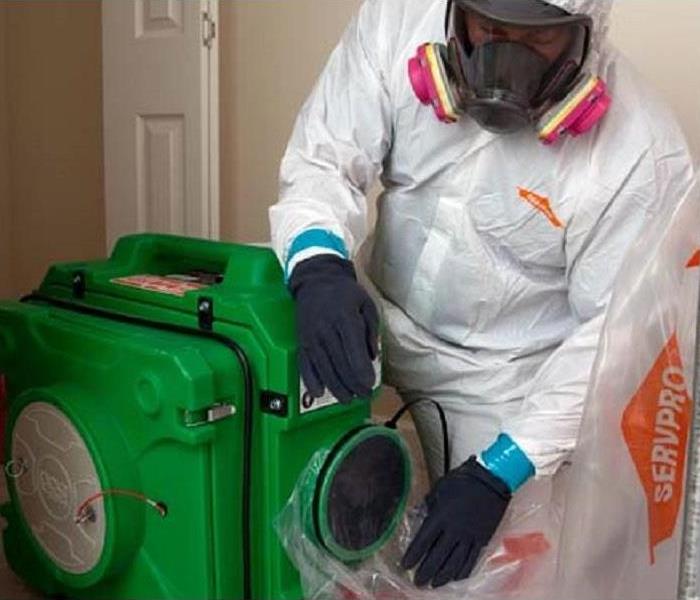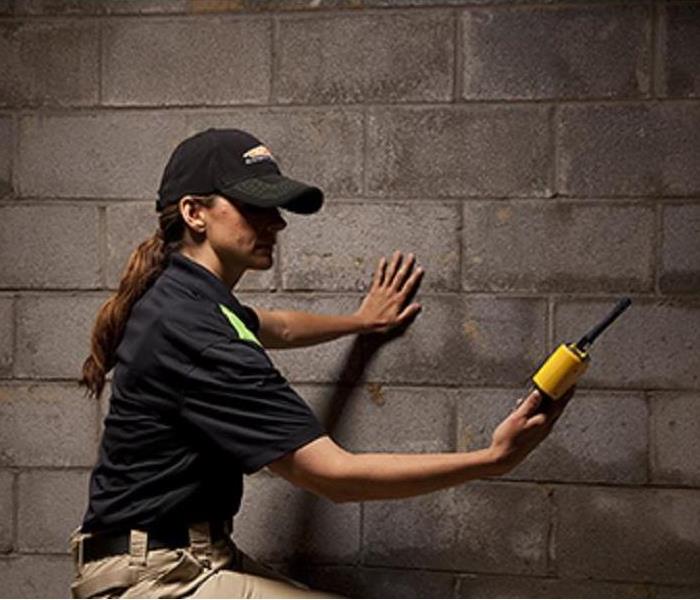Archived Water Damage Blog Posts
Ice: Good for Skating, Bad for Pipes
1/6/2025 (Permalink)
As the winter gets colder, there are more fun activities to do outside, which makes the season more exciting. Unfortunately, this also means an increase in elements to protect your house from in order to avoid needing professional residential cleanup or restoration services. What’s a common denominator between the two? Ice.
Great for skating and fun to sculpt, you don’t want ice coming in contact with your home’s pipes. SERVPRO of Danvers knows how to ensure the water stays flowing, so you can focus on the winter wonderland fun to be had outside.
Keep The Water Flowing!
We do not want your pipes to freeze -- and neither do you. Frozen pipes can result in exploding pipes and ultimately, water damage throughout your home. How can this be avoided?
Here is what you need to know!
- Keep that garage door closed! This is the best way to protect your house’s water tank if it is kept in the garage or down below in the basement.
- Keep interior doors open! Heat will flow more easily throughout the house if doorways are kept open.
- Speaking of heat, keep it on! Keeping the house warm ultimately keeps the pipes warm.
- Let faucets drip! If it is dripping, water is able to continue to move through your pipes, preventing any potential backup or freezing.
This winter, get out there to ski, sled, and skate whenever the opportunity presents itself! Just be sure to put these helpful hints into practice in order to keep any of that ice out of your pipes.
When temperatures start to freeze, turn to the experts to keep your home’s water flowing. Your neighborhood SERVPRO team is always ready and prepared to help with any emergency service or potential water restoration needs! Contact SERVPRO Danvers / Ipswich, 24/7!
Beware at-home water damage remediation hacks!
6/8/2023 (Permalink)
Here in New England, we are fortunate to live in an area rich with history. Many historic landmarks are still standing to this day, some people reading this may even live in one of these incredible houses. It is no hidden secret that as buildings get older they require more upkeep and tend to be more susceptible to water damage and mold. These situations are not only devastating but can also be incredibly overwhelming to try and deal with on your own. The internet is full of at-home, do-it-yourself solutions, but there is a high likelihood that the homemade solutions offered up will only be a temporary fix, or may even make the situation worse! We have many trustworthy and factually accurate resources here on our blog, as well as trained professionals on call 24/7 ready to help you make it “Like it never even happened.”
Can Spring Floods Cause Disease?
4/29/2022 (Permalink)
We might be rounding the corner on flu season but that doesn’t mean we can let our guards down when it comes to spring floods and the diseases that contaminated flood water can contain.
The spring season in New England tends to bring its fair share of storms, some of which can deliver high winds and significant amounts of rain. We all know that floods pose the threat of water damage to commercial and residential buildings, but did you know that wading around in flood water might expose you to certain pathogens that can make you really sick?
For instance, the bacteria in flood water can be concentrated enough to cause the following injuries or illnesses:
- Gastrointestinal illness
- Leptospirosis
- Skin rashes
- Tetanus
- Wound infections
Help! I unintentionally came in contact with floodwater… What should I do?
First rule of thumb is always: don’t panic.
If you do encounter floodwater, protect yourself from possible exposure to these pathogens by cleaning the area with soap and water, or relying on hand sanitizer until you have access to clean water.
Make sure you wash your clothes in hot water, ensuring they are completely clean and thoroughly dry before re-wearing them.
In the event that you have to wade through flood water for any reason, it’s best to only do so after suiting up in protective gear, including goggles, gloves, and rubber boots.
For all structural water damage and water remediation, contact SERVPRO of Danvers / Ipswich!
Ah, Spring: The Season of Floods
3/29/2022 (Permalink)
Spring is an easy season to love; however, for those of us in New England, springtime can be too short and, often, well… soggy. Some seasons have proven tougher than others, however, and a little perspective can go a long way when it comes to withstanding a few rainy days in a row.
Take, for example, the Spring Floods of 1936.
This historic weather event caused serious storm damage across New England, to the tune of $113,000,000, and took the lives of 24 people, leaving 77,000 homeless. When it came to water damage, Hooksett, NH won the “prize” with Main Street drowning under an estimated 18-20 feet of water.
While it’s hard to imagine what water damage restoration looked like back then, we’ve got all the modern methods, strategies, and equipment to handle any water damage this spring season might deliver.
Contact SERVPRO of Danvers / Ipswich if spring storms put a damper on your plans!
That Unsteady Toilet Seat Has a Secret
2/25/2022 (Permalink)
Sure, that sounds silly but the truth is if your toilet seat has started to feel unsteady, there is a good explanation for it… and one you’ll want to remedy right away.
The fact is, residential water damage comes in many forms. Sometimes, it suddenly appears right above our heads in the form of ceiling water damage, possibly from a rickety roof or from an upstairs bathroom.
Water damage that begins in the bathroom often results from an overflow of water, typically the bathtub but can also come from the sink. Where it tends to hide, however, is right below your toilet. In this scenario, the wax ring between the base of your toilet and the toilet flange, which is connected to the drainpipe, might weaken and leak.
A telltale sign might be water pooled around the toilet base; or, even worse, no signs of water at all because it has soaked into the subfloor, out of sight.
Whatever the cause, clear or concealed, contact SERVPRO of Danvers / Ipswich whenever and wherever you encounter water damage to take advantage of our professional water damage restoration services.
Get Soaked and Celebrate National Bubble Bath Day!
1/31/2022 (Permalink)
Good news!
New Year’s isn’t the only holiday worth celebrating in January. And it’s certainly not the only occasion that calls for bubbles.
Did you know that January also marks National Bubble Bath Day? At SERVPRO, we’re on board! After all, what better way to chase away the chills on these cold winter days?
That said, you’ll want to avoid any water damage that comes from leaky tubs, kids splashing water over the sides, or an accidental overflow, thanks to distractions like an unexpected phone call or delivery at your door.
You don’t need a designated day to enjoy a luxurious soak in a bubble bath. Just make sure that you pay close attention to the maximum fill line to avoid any water damage in your bathroom or, if you're upstairs, ceiling water damage to your rooms below.
Make any day or every day bubble bath day and contact SERVPRO of Danvers / Ipswich for any resulting water damage or water damage restoration services.
Fact or Fiction: Draining Your Pipes Protects them from Freezing.
12/30/2021 (Permalink)
Going on vacation this winter? Perhaps you are traveling to see family or just going away for a solo sojourn in search of some much needed rest and relaxation.
No matter where your winter vacation takes you, make sure your home -- specifically your pipes -- are secure before you go.
Traveling? Should you Drain your Pipes?
Yes! It is true that draining your pipes helps prevent the freezing effects of a harsh winter. In the winter, water left to build up in your pipes will potentially expand and turn to ice. This can create an expensive water damage repair process, which you certainly don’t want to return home to.
To avoid the need for professional water damage repair, drain your pipes and keep them warm. You can do this with insulation material or wind heater tape around the pipes. These steps are an extra precaution in order to avoid a water damage nightmare.
Enjoy your vacation this winter with the knowledge that you were proactive when it came to your pipes. Of course, if you forgot, or somehow the winter elements got the best of your pipes, your trusted team at SERVPRO Danvers / Ipswich is ready to step in and help.
Save Your Sprinklers from Seasonal Freeze
11/21/2021 (Permalink)
It is not just animals that go into hibernation when the ground starts to freeze. Your sprinkler system should, too! There is a whole winterization procedure that should be followed in order to protect your system from the harsh elements. Just turning off the valve or having the system underground is not enough to keep it safe through a long, cold winter.
What Can Happen?
The first freeze comes and the inevitably colder winter weather could lead to an underground rupture of the sprinkler system, specifically the shutoff valve. This could result in damage to your home’s foundation, or even lead to flooding in the basement.
As a result of this, there could be extensive water damage and the need for some immediate water restoration service. So, how can you avoid this?
Winterize for the Win!
Try the manual drain method, which allows you to winterize your sprinkler system in four steps!
- Shut off the water supply to the system.
- Then, look for the manual valves at the ends and low points of the piping.
- Open all the valves and drain the water from the system.
- Make sure you also drain the backflow device.
Getting this done before the first freeze could save your sprinkler system and keep your home safe from seasonal water damage.
As always, never hesitate to contact SERVPRO Danvers / Ipswich for any water damage or water restoration issues.
So I Hear Your Basement is Flooded…
10/21/2021 (Permalink)
When you are basement-bound to get some laundry done, the last possible thing you could ever want is to descend into shin-deep water. Even though this is a major headache, at SERVPRO Danvers/Ipswich, we’re pros at handling this problem.
Here’s a little sneak peek of the steps and strategies that should follow a flood in your basement…
Water Removal is Number One
The most important thing to do is have the water removed as soon as possible. Anything more than a few inches of water will exceed what a wet vac can handle. Removing the water quickly is critical to preventing mildew and mold growth.
Dry and Ditch
Let your floors dry out! Dehumidifiers can help with this process and you should also take care to throw away anything that is completely water damaged, such as cardboard boxes.
A Clean Start
Cleaning and scrubbing your basement floor is necessary after a flood, even a minor one. Rather than attempt any DIY measures, it’s best to play it safe and reach out to your local leader in water restoration right away.
Pro Tip
Did the flood waters drench some important documents down in the basement? Try throwing them in the freezer for a little bit, which could help slow the potential growth of mildew. Of course, it is best to avoid this issue altogether by storing important things in large transparent boxes and placing them on shelves, high off of the floor.
More questions about what to do with a flooded basement or need our services? Contact us so we can help you get this headache under control!
Water Damage and Disaster Caused by Dishwasher
9/27/2021 (Permalink)
It reads like a bad headline, but dishwashers can deliver more than a clean basket of cutlery. The problem with water damage caused by dishwashers is that, in most cases, it was a small leak that was left untreated for too long.
By design, dishwashers are sealed so that the water stays inside the appliance. It’s not the actual tub itself that is typically the problem, but the water supply lines which can leak, letting water collect in places you cannot see.
It’s no wonder then that you might discover serious damage to your subfloor in the event that you have to move your dishwasher -- whether to make room for a new model or as part of an overall kitchen renovation project. Ultimately, this discovery can amount to an added expense to replace the floor, as well as the dishwasher.
Unfortunately, the additional expense doesn’t stop there. In some cases, a leaky dishwasher has also ruined floor tiles, along with electrical wiring connected to other appliances in the kitchen. Wooden baseboards and wall trim can also fall victim to a leaky dishwasher. All good reasons to ensure your dishwasher is maintained for optimal operation and less chance of leaks.
In the event of a dishwasher leak and resulting damage, your SERVPRO of Danvers / Ipswich is standing by with expert water damage repair and restoration services.
Contact our team today!
Back to Basics: A Beginner’s Guide to Water Damage
9/3/2021 (Permalink)
When you’re in an industry like ours, talk of water damage is commonplace around the office, but to anyone else, it can seem like total gibberish. So today we’re taking things back to basics with a beginner’s guide to water damage.
First things first, what IS water damage? Well, it’s exactly what it sounds like; damage caused by water. The most common examples of it are flooded basements and burst pipes, but water damage can come in many different shapes and sizes.
When does water damage occur? It can happen any time but are especially common in colder months and after instances of heavy rain.
When should water damages be repaired? The sooner the better! It may make us sound self-serving, but as experts in water damage, we can tell you that the longer water damage is left untreated, the more damage it can cause. Water damage left untreated has the potential to cause mold, which isn’t healthy.
For tips on how to tell if your home might be experiencing hidden water damage check out this blog post, and for more advice on how to deal with water damage, or to schedule a free estimate with one of our experts, give us a call!
Water Damage Restoration: What You Need to Know
7/17/2021 (Permalink)
Unless you live in a known flood zone, or know that your roof should have been replaced about a decade ago, you probably don’t have water damage restoration in your plans for this year. Or any year. And why would you when you could put that money towards a college fund, a vacation, or anything else. Unfortunately, floods, leaks, and other water disasters happen, which will cause you to spend money on a water damage restoration company to repair your home.
How can you find the right Massachusetts water damage restoration company? Here’s what to look for and keep in mind:
Insurance
We work with most insurance companies, and probably work with yours. For a stress-free claims process for your water damage, we can help you manage your insurance paperwork and the process.
Reviews and recommendations
Talk to your local neighbors and friends and see who they’ve worked with to handle emergency situations. Or go online and look at our Testimonials. Here’s just one happy customer in Barb from Salisbury:
“We had a flooding issue after our toilet overflowed for several hours during the night. My insurance guy recommended SERVPRO and what a Godsend!!!! A team arrived and had our house rocking with dryers and the next day Brian came and started the process rolling. Through everything Chris explained every procedure, answered every question and kept the clean up/demo moving. Chris, along with Justin, Dan, Steve, and Jerry kept the house as clean as possible while they removed ceilings, walls, cleared out our basement and hauled it all away. They were polite, cheerful and I was completely comfortable knowing they were on the job. I have already spread the word and am glad to sing their praises. These guys are the BEST!”
Remediation and Rebuilding in One
Work with a company that can handle your water damage remediation as well as any rebuilding or reconstruction services that you need. Our professional team at SERVPRO of Danvers / Ipswich can simplify your water damage restoration process by helping you with both the remediation and restoration and the rebuild. Using one expert company for all of your water damage restoration needs alleviates your stress of having to find a contractor on top of everything else, saves you time, and keeps your costs low.
These are just some of the rebuilding and restoration services that our construction division offers to restore your home to its original state:
- Drywall removal and installation
- Hardwood floor repair
- Tile floor repair
- Painting
- Carpet repair and installation
Contact us here at SERVPRO of Danvers / Ipswich for an assessment of your water damage in Massachusetts along with a plan for remediation and rebuilding to bring your home back to its pre-water damage state.
Washing Machine Leaking? What to do Next
6/10/2021 (Permalink)
When your washing machine is running, you expect to hear water doing its job mixing with the laundry detergent to create suds and clean your clothes. What you don’t expect to hear or see is water leaking out from your washing machine and hitting the floor, walls around your washing machine, or the rug outside your laundry area.
If you’re lucky enough to be home when your washing machine leaks, you may be able to fend off major water damage and see the cause of the leak, so you can try to repair it yourself or alert your washing machine repair person on the source. Typically, a washing machine leak occurs in the tub, the pump, or the hose.
Before you do anything, you need to shut off the power to your laundry area and also shut off the water supply at the valve.
If you went out after turning on your washing machine, you may not realize there’s a leak until you return home to a wet floor, at which point you’re in damage control mode and need to clean out the water and dry out what you can before calling for a repair person.
Once that’s done, your next step to prevent mold and water damage is to get the water out of your laundry area and surrounding areas since mold can grow in just 24 to 48 hours. If it’s a small amount of water, you could use a wet/dry vacuum or a sump pump.
If you have more than an inch or so of water, hire a local emergency water removal service like SERVPRO of Danvers / Ipswich. We know how to get the water out of your home from your washing machine leak and then dry out your home and even your documents with professional fans, dryers, and dehumidifiers. We will also assess your water damage from the washing machine leak and offer remediation services.
Contact us here at SERVPRO of Danvers / Ipswich for an assessment of your water damage in Massachusetts along with a plan for remediation and rebuilding to bring your home back to its pre-water damage state.
How to Rebuild Your Home after Water Damage
5/14/2021 (Permalink)
 Noel Torrissi (pictured) and his team are here to help you rebuild after water damage in your home.
Noel Torrissi (pictured) and his team are here to help you rebuild after water damage in your home.
In warmer weather, our thoughts turn to taking a dip in a pool or running through a sprinkler on a hot day; trips to the beach or a campground; and lots of outside time taking walks or hikes, and drinking water to stay hydrated.
Yes, you want to spend a lot of time near or drinking water during the summer, but — unless you’re quite wealthy — the last thing you’re thinking about is an indoor pool, especially in the form of a pool created by a burst pipe or flood.
Unfortunately, such water damage events do happen, no matter the time of year. You probably already know that SERVPRO can help you with your Massachusetts water damage remediation, like getting the water out of your house; drying your documents (yes, we do that!); and cleaning/sanitizing your belongings.
But did you know that we also have a full construction division, run by Construction Manager Noel Torrissi, that can help you rebuild your home after water damage?
These are just some of the rebuilding and restoration services that our construction division offers to restore your home to its original state:
- Drywall removal and installation
- Hardwood floor repair
- Tile floor repair
- Painting
- Carpet repair and installation
Our professional team at SERVPRO of Danvers / Ipswich can simplify your water damage restoration process by helping you with both the remediation and restoration and the rebuild. Using one expert company for all of your water damage restoration needs alleviates your stress of having to find a contractor on top of everything else, saves you time, and keeps your costs low.
Contact us here at SERVPRO of Danvers / Ipswich for an assessment of your water damage in Massachusetts along with a plan for remediation and rebuilding to bring your home back to its pre-water damage state.
How to Prevent Bathroom Water Leaks
4/17/2021 (Permalink)
Unless you’re a plumber, you probably don’t think about the various ways water gets into and out of your bathroom toilet, sink, tub, or shower. Why would you? The only time it comes to mind is either as a passing thought or when you realize there’s a leak in your bathroom and investigate the source.
Here’s how to make sure that your bathroom is as sealed up as possible from the beginning to prevent water leaks and the potential of bathroom water damage:
- Sink: A bathroom sink is usually part of a bathroom vanity (the cabinet that the sink sits on top of). If there’s a leak in the sink, you generally find out when you open the cabinet door underneath and notice a puddle of water or see water seeping out of the cabinet door. To prevent such leaks, caulk (either silicon-based or latex-based) is applied to seal the gaps around your vanity and the sink itself. The caulk can last for a number of years, but does need to be removed and reapplied at a certain point because it can then break down, letting water get through.
- Toilet: When the toilet was installed, a wax ring was placed around the hole in the floor to act as a water barrier between the bottom of your toilet and the sewer pipe. If that wasn’t installed properly, it could result in a leak and needs to be replaced.
- Shower: Prevent leaking shower heads and resulting water damage by fully tightening the shower head to the attachment. First, do so by hand and then use a wrench or pliers to ensure the shower head is firmly attached.
- Tub: To prevent a leaking tub, apply 100% silicone caulk along the edges and sides of your bathtub and the walls/tiles and between the bottom of your tub and your floor. This will serve as a watertight seal.
Has your bathroom sprung a leak, resulting in water damage or bathroom mold? Contact the Massachusetts water damage restoration experts at SERVPRO of Danvers / Ipswich for a water damage assessment as well as a remediation plan for water damage restoration.
Top Signs of Water Damage in Your Home
3/17/2021 (Permalink)
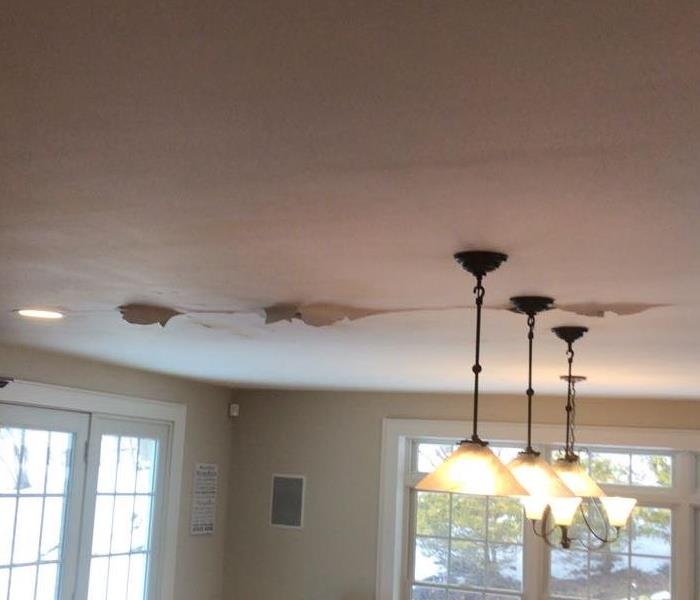 The paint on this kitchen ceiling started peeling because of a water leak.
The paint on this kitchen ceiling started peeling because of a water leak.
There are two types of water damage: the type you can blatantly see (in the form of puddles or floods) and the type you can’t see, in the form of hidden water damage behind your walls, in your rugs, or inside your ceiling.
But even if you can’t see the water right in front of you, there are ways you can tell if there might be water damage in or underneath your home that needs to be addressed.
- A musty smell that wasn’t there before. If your basement or one of your rooms starts smelling musty, there may be hidden water damage that resulted in mildew or mold.
- Bubbles in the paint of your ceiling. Yes, these could be just from steam in your bathroom forming a coat of moisture, especially if they’re on top of your shower, but they could also be caused by water that collected in your ceiling and is popping through the ceiling as a bubble. This is particularly bad if it’s not a pin-sized dot of a bubble and is instead the size of a dinner plate or larger. That water damage should be remediated immediately.
- Peeling or stained paint on your wall. This is the same as bubbles on the ceiling, except that in this case, the paint could be flaking off or stained from water that has collected in between your drywall and the layers of paint.
- An increase in your water bill. Stay on top of what you pay each month. If it has suddenly increased without any uptick in water usage, you could have a hidden water leak.
Think there’s water damage in your home and you want to be sure? Reach out to the Massachusetts water damage remediation experts at SERVPRO of Danvers / Ipswich. We have state of the art technology to assess and spot the water damage you can’t see and to restore your home to its pre-water damage state.
Basement Flooded? Take These Steps
3/3/2021 (Permalink)
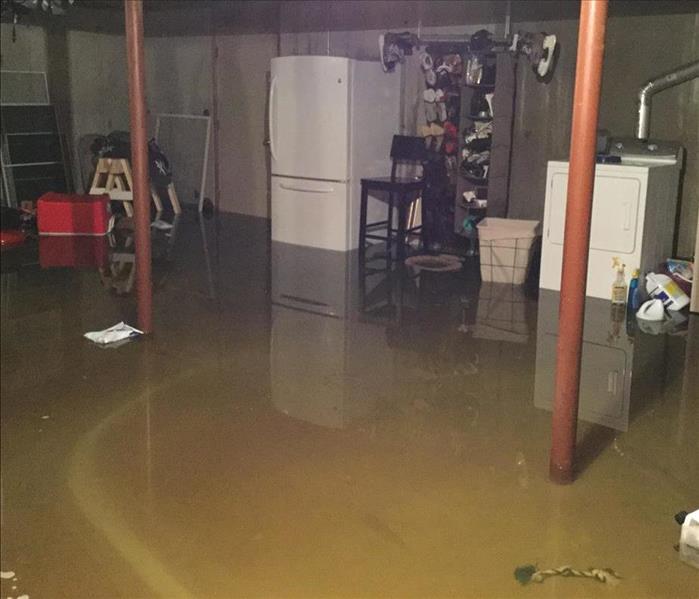 If you find your basement is underwater, give us a call. We're here to help 24/7.
If you find your basement is underwater, give us a call. We're here to help 24/7.
No one wants a flooded basement, but they do happen. A basement flood can be caused by seepage through a fieldstone foundation; water gushing in after a heavy rainstorm or from melted snow through a crack in the basement wall, door, or floor; sump pump failure; or a sewer backup.
The second you realize that your basement has flooded, you need to take action.
First, shut off the power. Do not step foot into the water in your basement with the power on in the basement. You run the risk of an electric shock. If your circuit breaker is in the basement, call a trusted electrician or the electric company to turn off the power at your house.
Once that’s done, your next step to prevent mold and water damage is to get the water out of your basement since mold can grow in just 24 to 48 hours. If it’s a small amount of water, you could use a wet/dry vacuum or a sump pump -- unless you store that wet/dry vac in the basement and the plug has been dangling in the water.
If you have more than an inch or so of water, hire a local emergency water removal service like SERVPRO of Danvers / Ipswich. We know how to get the water out of your flooded basement and then dry out your basement with professional fans and dehumidifiers while also assessing water damage from the flooding and offering remediation services.
To air out your basement, if you’re doing it yourself, you can open the basement windows and any doors and strategically set up fans and dehumidifiers to help in the process.
Contact us here at SERVPRO of Danvers / Ipswich for help with your flooded basement clean up and restoration.
Insurance and Water Damages
2/5/2021 (Permalink)
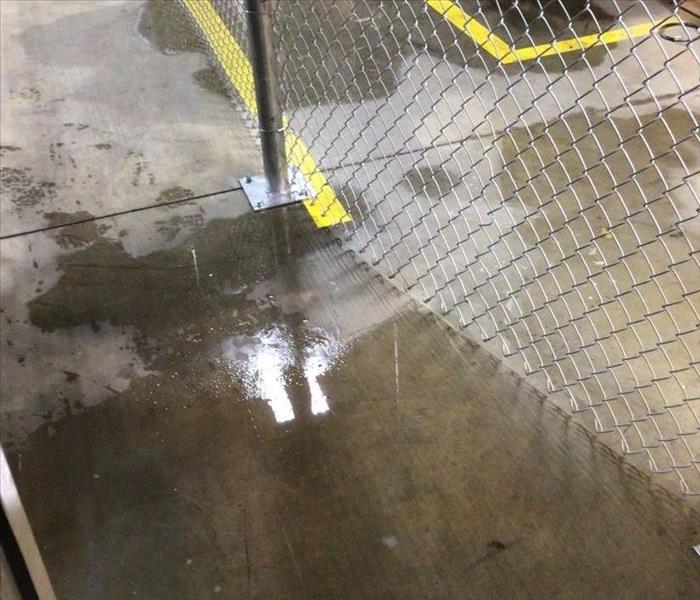 An example of a flooded basement.
An example of a flooded basement.
In her first blog post, Key Account Manager Nury Cardoza shares some insights about water damages:
Did you know you are more likely to experience floodwater damage than fire damage during your 30-year mortgage? For that and other good reasons, it makes sense to ask for flood insurance. One in every four insurance claims during the last two years was the result of water damage, and not every kind of water damage is covered by insurance.
Examples of water damage usually covered by insurance are:
- ice dams
- leaking roof
- frozen burst pipes
- accidental plumbing or appliance issues
- vandalism.
Water damage not usually covered by home insurance:
- groundwater getting into the basement
- floodwater or rapid- thaw water getting into the basement unless you have flood insurance
- sewer or water pipes back up unless you have a cover added to your home insurance policy
- leaks from corroded pipes
- leaks from an unmaintained roof
- damage from long term leaky faucets or toilets
- mold or fungus unless it resulted from covered causes
Remember that getting a qualified water damage cleanup and restoration company is as essential as obtaining the right insurance coverage. SERVPRO works with many insurance companies, which makes the whole process less stressful and faster for you. Day or night, 365 days a year, we are here to help.
Avoid a flooded basement, this year and forever!
1/22/2021 (Permalink)
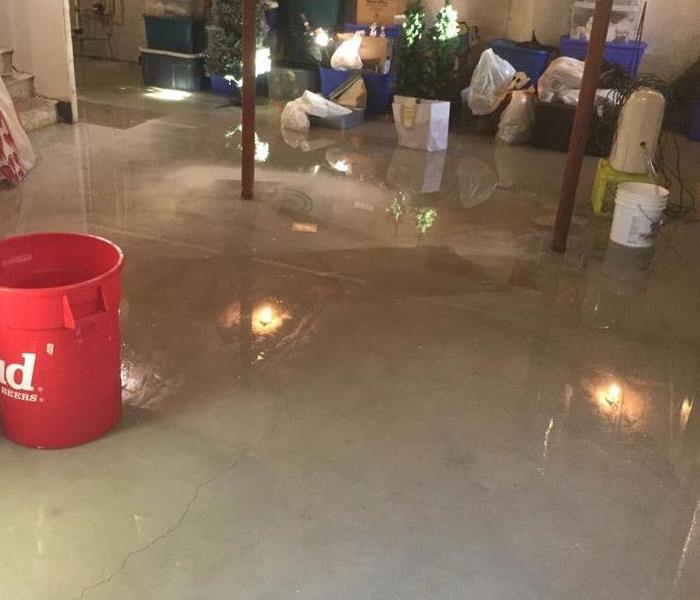 Follow these tips to help protect your basement from flooding in the future!
Follow these tips to help protect your basement from flooding in the future!
Weather in Massachusetts is unpredictable, so even if you don’t have a lot of snow now, you never know what Mother Nature has in store for the rest of the season.
In late winter and early spring, the ground can’t absorb all of the rain and snow melt, so it flows along the foundation. Foundation cracks that weren’t a problem before have the potential to become a huge problem now. A proper drain system, sump pump and sealed cracks will help you avoid problems this spring.
Here are a few simple tips:
- Keep your gutters clean (this will keep rainwater from flowing directly to your foundation)
- Grade landscaping away from foundation (add mulch or soil at an angle, higher at the foundation, slanting away)
- Check your sump pump or purchase a submersible pump and fans.
Move valuables and expensive items you may have in your basement or use pallets and shelves to keep them elevated.
When there is a natural disaster, often the emergency items you need are sold out, so plan ahead.
If you do have a flood
There are still things you can do to mitigate the damage.
- If you can do it safely, turn off the electricity.
But don’t get electrocuted! If you can reach the breaker without standing in water turn it off.
- If you’ve got just a bit of water in spots consider yourself lucky. If you can clean it up with a wet vac and have fans to dry it afterward you might be all set.
- If your basement has flooded more than an inch, it’s best to call us.
If you have a sump pump and fans, you may still wish to tackle the job by yourself. Submersible water pumps work best when you place them in the deepest part of the flooded water. If dirt and debris build up and clogs the screen around the pump, clean it out and consider using something like a small tool to prop it up a bit. This will increase the space for water to flow through the pump. Use the widest and shortest hose possible, this will enable the pump to work faster.
When all the water is up, and it appears dry you may still want us simply to treat the previously flooded area to kill any mold before it’s an issue.
To avoid this problem next year, you must identify where the water came in.
- First, seal the cracks.
- Then, dig to avert water flow next time.
Remember water will travel down the path of least resistance. It is strongly advised to dig outside near the foundation and repack the soil. Dig down to where the water came, and then dig out and to the sides a few feet. There is a channel that you may not see but you will disturb and avert if you do this. Next year, water will not flow in that same direction if done correctly.
Last but not least, having a dehumidifier in any basement, old or new, is a must to help reduce the amount of excess moisture in the air.
Recap:
- Clean your gutters.
- Have a sump pump, wet vac and fans.
- Fix lawn grading.
- Seal the cracks.
- Dig to avert water flow next year.
- Have a dehumidifier.
If water comes in and it’s too much to tackle yourself, call us. Mitigating water damage is one of our core competencies. We’ll tackle the job at hand and be sure your water problem doesn’t become a mold problem later.
Hidden Water Damage
9/10/2020 (Permalink)
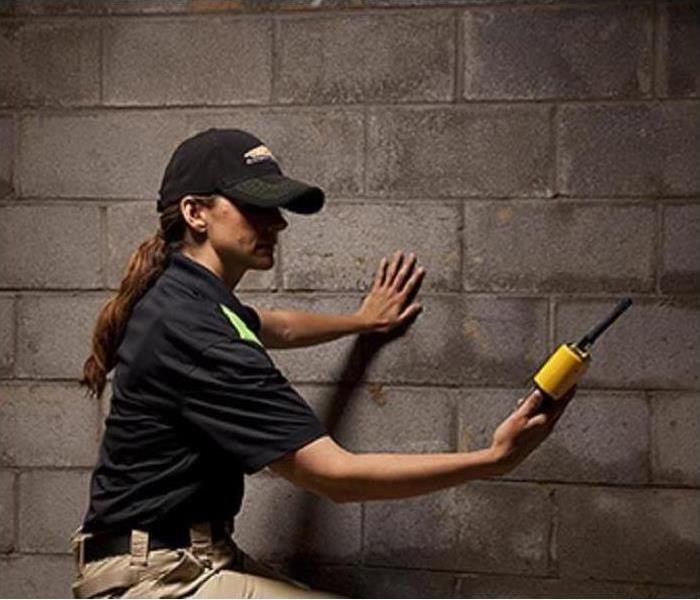 An example of a Moisture Meter in use.
An example of a Moisture Meter in use.
Even Minor Water Damages Need Major Technology –
Small water damages can sometimes lead to big problems if it’s not handled properly at the onset. The key to avoiding costly restoration is to treat even the smallest of water problems as a real threat to your property. This means adequate technology & equipment should be a priority when mitigating any loss.
Some of these tools are not readily available, or easy to use. SERVPRO of Danvers/Ipswich has the equipment, training and experience to find and dry hidden water before secondary damages occur.
Here are a few of the tools we use:
- Moisture Sensors are used to detect moisture in carpets and baseboards.
- Moisture Meters (pictured) are used to determine the actual moisture content of various materials. These moisture testers provide accurate readings that allows our trained professionals to monitor the drying process.
- Thermohygrometers measure temperature and relative humidity. When armed with this information, our team can calculate and create an environment most conducive to drying your space.
Contaminated Water
9/10/2020 (Permalink)
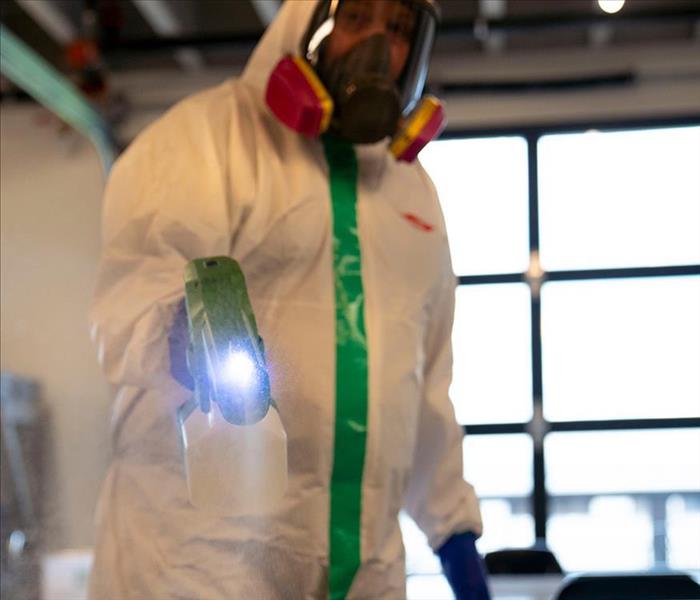 A Thermal Fogger in action.
A Thermal Fogger in action.
Love that Dirty Water…only in the Song!
When facing a contaminated water loss, it’s important to understand that disinfecting is just as important as drying. There are different levels of contamination, with the highest being a Category Three (or Black Water). According to owner, Pat Lavigne, this level of contamination could be considered a Biohazard and requires a more intensive process.
If you have a contaminated water damage, it’s imperative to pull in a professional remediation company such as SERVPRO of Danvers/Ipswich. In addition to professional training and hospital grade disinfectants, we can also use state-of-the-art technology that is not readily available to the general public.
Two of the tools we use are:
- Ultra-Low-Volume (ULV) Foggers will atomize liquid deodorizing agents, producing a fine mist that can easily penetrate the site where odor-causing residues may accumulate. This device can also be used to inject fungicides and disinfectants into wall cavities and other hard-to-reach places.
- Thermal Foggers (pictured) use heat to vaporize a fogging solution. The fog consists of tiny particles of deodorant solution that attach to and neutralize odor causing molecules. Thermal foggers can produce very tiny particles, which range from 0.5 micron to 50 microns, so it is able to permeate even the narrowest of crevices.
If you have a water damage you believe to be contaminated, call in the professionals. We are open 24/7, so if you ever find yourself in hot (or dirty) water, we’ll be there, ready to help make it “Like it never even happened.”
Estimator Tips
9/4/2020 (Permalink)
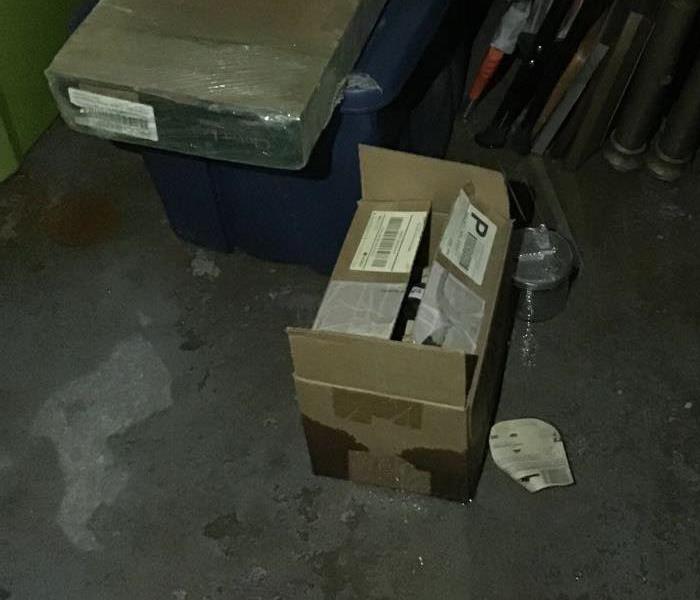 Example of personal items affected by water damage in a basement.
Example of personal items affected by water damage in a basement.
Storm season in New England is in full swing. Although these storms can move out as swiftly as they move in, we often experience such heavy rains that the ground simply cannot absorb it all quickly enough. When that happens, the water will find the downward path of least resistance, which can often be your basement.
We asked two of our Project Estimators, Brian Carifio and Ross Martin, about their best advice for homeowners after heavy rainstorms. Here is what they had to say:
- What’s the first place you would advise a homeowner to check after a storm?
Brian Carifio: The Basement. Water will find its way there. Ideally, if they’ve been pre-emptive, they’ll have their contents up off of the floor on plastic shelving and/or in plastic containers. Keeping contents 2–4 inches off the floor will help to avoid most flooding concerns. If the water reaches above that, they have a whole other set of problems. Plus, content damage is not generally covered by insurance when due to flash flooding.
- Okay, they’ve done that but they still have water in the basement. What should they do next?
Brian Carifio: Call SERVPRO. Not to sound self-serving but the longer the homeowner waits…or tries to resolve it themselves, the greater the probability of mold beginning to grow. Most DIY attempts at mitigating water damage fail simply because the necessary equipment is not available to consumers. You need strong extraction systems, high capacity dehumidifiers, and air movers (not to be confused with oscillating fans).
- What’s the worst thing a homeowner can do when they find water in their basement?
Ross Martin: Put an oscillating fan on the standing water. First of all, you can run the risk of electrocution. Beyond that, fans only whisk the air off the top of the water’s surface and move it into the air. Doing that without proper dehumidification in place can lead to mold on other surfaces.
- Can you explain that process more?
Ross Martin: Sure. When you have a flood, if left alone the water will eventually evaporate. But that doesn’t mean it disappears. It simply changes from a liquid to a gas and moves into the air. Moisture in the air is relative humidity. That humid (moisture heavy) air is then able to touch & attach to every single surface in that space and beyond. This is the “perfect storm” for mold growth.
Our process is to first extract the water with truck mounted vacuums, then use our air movers and dehumidifiers simultaneously. The movers circulate the air, keeping it from absorbing into surfaces while the dehumidifiers remove the moisture from the air.
- Can’t homeowners do this themselves?
Ross Martin: Yes and no. There are several points to consider. First, consider the weight of water (not the movie!). A gallon of water weighs 8.34 lbs and most shop vacs hold 10 gallons. That means you’re carrying 83.4 pounds upstairs, multiple times.
Secondly, most people have fans in their home and will put several on the affected wet areas, thinking this will dry it out. It won’t. Fans are not strong enough and they don’t actually dry anything. They just move the moisture off the top surface, dispersing it throughout the air.
Lastly, most consumer-bought dehumidifiers are too small to effectively dry the air in an average sized basement. Most are purchased rated at 30 PPD (Pints Per Day). That’s how many pints of moisture it can handle per day. Our smallest is 70 PPD and goes up to over 133 PPD.
There are some steps you can take before help arrives though.
- Remove excess water by mopping and blotting.
- Wipe excess water from wood furniture after removal of lamps and tabletop items.
- Remove and prop wet upholstery and cushions.
- Place aluminum foil or wood blocks between furniture legs and wet carpeting.
- Turn air conditioning on for maximum drying in summer.
- Remove colored rugs from wet carpeting.
- Remove art objects to a safe, dry place.
- Gather loose items from floors.
Prepare for Hurricane Water Damage
9/2/2020 (Permalink)
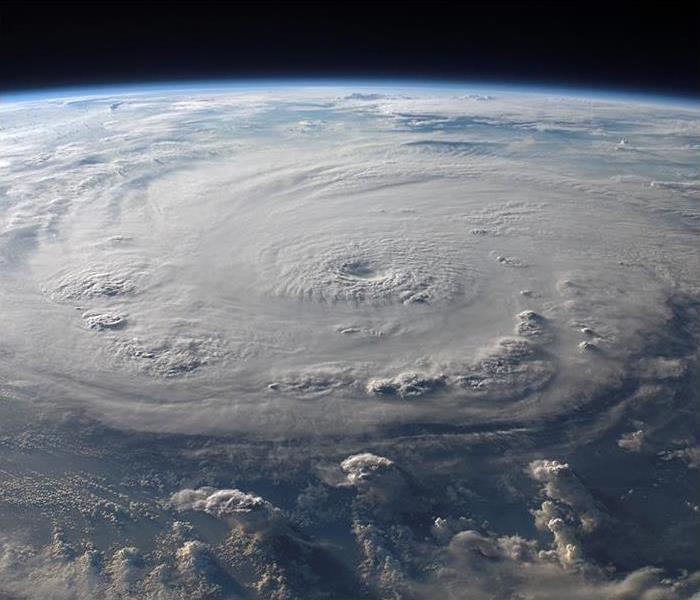 The eye of a hurricane. Photo courtesy of pexels.com
The eye of a hurricane. Photo courtesy of pexels.com
It should be no surprise that the 2020 Hurricane season is breaking records. According to Wikipedia, the 2020 Atlantic hurricane season is the first on record to tally nine tropical storms formed before August and thirteen before September. So far, a total of 14 tropical depressions, 13 tropical storms, four hurricanes and one major hurricane have developed. The latest, Laura, has just made landfall in LA as a Category 4 hurricane. This means it brings maximum sustained winds of 150 mph or greater and catastrophic storm surges.
Noel Torrissi, our Construction Manager, suggests covering storm and ocean facing windows as the first order of business. “Taping is always an option if boarding isn’t possible. Any way to create a barrier that can hold or stop flying glass should be your first concern. Incomplete, new construction is less of a concern as the materials are always exposed to the elements. Focus on safety first. We can rebuild any structure, but we can’t replace you.”
Secondly, if you have a generator, make sure it works before the storm barrels in. That means starting it up and gassing it up. You could be without power for hours, or days, depending on the severity of the storm. As always, generator safety is a priority. This means keeping it outside, even in a hurricane.
Water Pressure Check
6/8/2020 (Permalink)
With summer right around the corner, it’s time again to turn on outdoor water sources. As you begin to break out the sprinklers and garden hoses, keep an eye out for lowered water pressure. A loss in water pressure may be nothing, but it also could indicate there may be a bigger issue lurking just below the surface. One way you can test for low water pressure is to turn the spigot on and press your fingers against it. The water should spray out through your fingers at a good, steady level. If the water doesn’t spray out, or seems to be flowing at an inconsistent rate, this may be a sign and further investigation should be done to check for leaks. If you do find yourself with water damage, SERVPRO of Danvers/Ipswich is here to help. Call us at 978-356-7077 to schedule an estimate.
Spring Weather Tips
3/24/2020 (Permalink)
While spring brings the promise of warm weather and longer days, it also brings a variety of conditions that can include heavy rains and severe weather, which can increase your flood risk. Take action to protect yourself, your family, and your business—before a weather event occurs and it’s too late.
April marks the start of the rainy season. Spring storms can bring several inches of rain in only a matter of hours or there can be consistent rainfall for days. These heavy rains can lead to severe flooding by over-saturating the ground, overfilling storm drains, or rivers spilling over their banks.
As one of the most common hazards in the United States, it’s important we prepare for the potential disaster that flooding can cause. Even if you feel you live in a community with a low risk of flooding, remember that anywhere it rains, it can flood. Just because you haven’t experienced a flood in the past, doesn’t mean you won’t in the future.
In order help prepare you for the possibility of a flood, we offer you these tips:
- Build an emergency kit and make a family communications plan
- Avoid building in a floodplain unless you elevate and reinforce your home
- Elevate the furnace, water heater and electric panel in your home if you live in an area that has a high flood risk
- Install check-valves to prevent flood water from backing up into the drains of your home
- Seal basement walls and floor with waterproofing compounds to prevent seepage through cracks
- Always keep your gutters and downspouts clean to allow water to flow freely
- Prepare a flood evacuation plan
- Know how to safely shut-off utilities
- Keep insurance and vital records in a water-proof box
- Have a portable radio to listen for important current information
When your home sustains water damage from flooding, you should call SERVPRO of Danvers/Ipswich
SERVPRO of Danvers/Ipswich has the equipment and experience necessary to handle the most challenging water damage and removal situations and we are available around-the-clock.
What To Do In A Flood Emergency
3/11/2020 (Permalink)
With spring on its way, so is the rain, and house and/or business flooding is a real concern. Luckily, we can step in to help minimize the damage and get you back to normal living conditions, but there are some other important steps to take as well.
Stop The Flow
Your first priority is stopping the flow of water. If the flooding is due to storm surges, you should be seeking safe ground. Your possessions are replaceable. You aren't!
If you have time however, turn off electricity at the fuse box. If you can’t reach the box without wading into water, call an electrician and stay out of the wet areas. Most people don't think of this step during a flood but doing so can save a lot of extra repair once you're back in the house.
Snap It, Document It
Before removing any water, document the damage for your insurance company. Capture the extent of the water damage and all possessions impacted by the flood. Digital photos are best because you can quickly upload them directly to your agent for assessment.
Contact your insurance company as soon as possible and follow their directions. Not all flooding is covered by a basic homeowners policy, so work with your agent to discover the cause and identify coverage you can qualify for. Do not remove any water before talking to them so you don’t accidentally do anything that will decrease the amount of coverage you’ll be able to claim. If the insurance company wants you to wait for an adjuster before making repairs, do so — but make sure you give them a clear picture of the damage and repairs that are immediately needed.
Protect Yourself
You won’t know immediately if the water is contaminated, so take precautions to safeguard your health. Wear protective gear like waders or rubber boots and rubber gloves before delving into the water and removing water-logged possessions. If possible, remove children from the home until the damage is assessed and contained.
We're Here To Help
We are truly "faster to any disaster." When your home or business has water damage, we have the expertise and equipment to properly restore your property. The water removal and water cleanup process is completed by our highly-trained technicians who will document the drying process. This validates that your property has been dried properly and thoroughly.
Please follow the tips outlined in our Water Damage Tips—Until Help Arrives Guide to protect yourself and your property.
Water Damage Prevention Tips
2/13/2020 (Permalink)
Your home's foundation is the glue that holds your house together. Water damage is the number 1 culprit in weakening the foundation of your home. If water damage goes untreated, it can weaken the structure of your house, causing you a lot of money in the long run. Follow these prevention tips below to protect your home from water damage.
#1 - Endure Good Drainage
- Clean your gutters.
- Direct downspouts 5-10' away from the house.
- Slope your yard away from the foundation.
#2 -Test Your Sump Pump
- Check your sump pump once a year.
- Test more frequently during the rainy season.
#3 - Fix Water Leaks
- Repair any noticeable dripping pipes.
- Repair any cracked caulking.
- Inspect the roof for missing, loose or damaged shingles.
If you or anybody you know has water damage that needs assistance, don't hesitate to call SERVPRO of Danvers/Ipwsich. We are available, 24/7!
Secondary Water Damage
1/24/2020 (Permalink)
Coming home from a vacation and you realize the basement has 3 inches of standing water. What do you do? First, you need to assess the situation. If a pipe bursts, shut off the water and call your local SERVPRO. If a sump pump failed, call your plumber as soon as possible. A quick response is the key to mitigating, or minimizing, the loss in water damage.
If the cleanup process does not begin immediately and the water begins to evaporate on its own you can begin to suffer the effects of secondary damage, also known as moisture damage. The air will absorb the water and become fully saturated. As the evaporation continues the water can get into things like drywall and ceiling tiles. Here are some tips you can follow that might minimize the amount of damage your house will suffer after a water loss.
- Remove water from flat surfaces by mopping
- Open doors and drawers on furniture for ventilation and drying
- Remove electronics and artwork to a dry area
- Elevate all furniture
- Call SERVPRO of Danvers/Ipswich for assistants. 978-356-7077
Avoid Burst Pipes & Ice Dams
1/17/2020 (Permalink)
Two of the biggest problems our customers encounter are frozen pipes and ice dams. A frozen pipe can burst causing considerable damage to your property if not addressed. Ice dams cause a back-flow under the roof’s shingles and can affect your structure’s interior areas. Below are some tips on how to prevent this damage and prepare your home for the winter weather.
Quick Easy Steps to Avoid Burst Pipes & Ice Dams:
- Keep cabinet doors open during cold spells
- Keep a slow trickle of water flowing through faucets
- Consider shutting off outdoor faucets
- Ensure gutters are clean and secure
- Inspect property for proper drainage to alleviate flood hazard potential
SERVPRO® of Danvers/Ipswich is your local fire and water damage restoration company. Servicing the North Shore and Merrimack Valley for over 30 years, SERVPRO® understands the stress and worry that comes with a fire or water damage and the disruption it can cause your life, home or business. Our goal is to help minimize the interruption to your life and quickly make it “Like it never even happened.” ®
Clean Those Gutters
6/10/2019 (Permalink)
With the rainy season upon us, it is crucial that you keep your gutters clean. Gutters are the exterior protectors of your home. They collect rainwater from your roof and divert it away from the structure and landscaping of your home. But as the storms start to roll in, those gutters may need your assistance.
Do you live in a woodsy area with pine trees? Those pesky needles like to collect in your gutters causing them to clog. Clean those gutters out quarterly with a leaf blower, gutter scoop, or power washer to ensure good water flow.
Make sure to inspect your gutters after a heavy storm! Debris can pile up and decompose after a storm, which can lead to an ant or termite infestation. Heavy rain, wind, and hail can also crack the gutter. So make sure to check on those gutters after a storm.
A neglected clog in the gutter can cause water to pool in your basement. Clean the debris from your gutters immediately after a basement leak. If the damage is severe, you may have to call your local SERVPRO to help repair the damages.
If you do find yourself with water damage, SERVPRO of Danvers/Ipswich is here to help. Call us at 978-777-3498 to schedule an estimate.
Prevent Water Damage This Spring
3/27/2019 (Permalink)
Springtime has arrived and now is a great time to take care of some outdoor maintenance of your home. You can prevent water damage in your home before it happens with a couple of simple tips.
Keep Your Gutters Clean
When leaves and debris clog your gutters, the water can’t drain out the downspouts and away from your property. This lack of drainage can cause the water to come back through the roof or the foundation, resulting in a flooded basement or water coming through your roof. Keeping your gutters clean is a simple way to prevent unwanted water from entering your home.
Outdoor Faucets
Sometimes outdoor faucet leaks are obvious- you will see the water dripping out. Other times, the leak isn’t visible from the outside. One way you can test for possible leaks is to turn the spigot on and press your fingers against it. The water should spray out through your fingers with good pressure. If the water pressure is low and doesn’t spray out, this maybe an indication of a leak and further investigation should be done to check for leaks.
If you do find yourself with water damage, SERVPRO of Danvers/Ipswich is here to help. Call us at 978-777-3498 to schedule an estimate.
Spring Showers Can Cause Flooding in Danvers
3/20/2019 (Permalink)
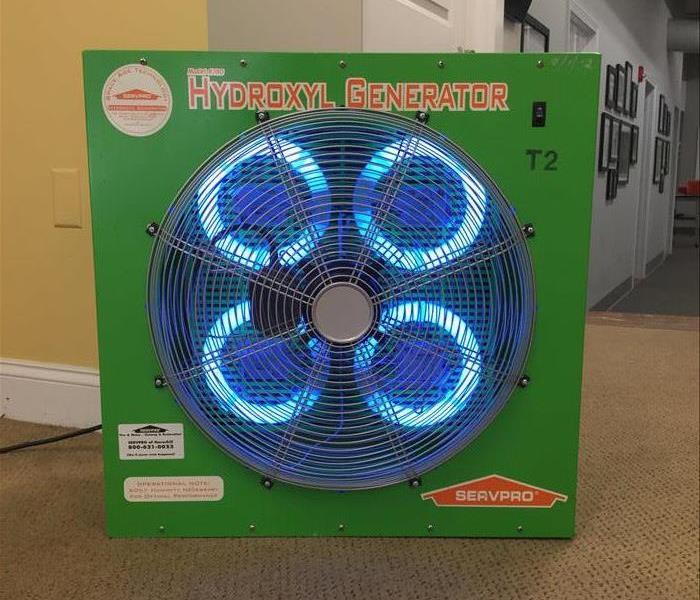 Photocatalytic Oxidizers remove unwanted odors and clean the air.
Photocatalytic Oxidizers remove unwanted odors and clean the air.
Springtime has finally arrived here in Ipswich, bringing longer days, rising temperatures, and yes, you guessed it...rain! April showers bring May flowers, but they also can bring flooding issues to your home or business. Spring storms can bring several inches of rain in only a matter of hours or there can be consistent rainfall for days. These heavy rains can lead to severe flooding by over-saturating the ground, overfilling storm drains, or rivers spilling over their banks.
Stagnant Water Odors
Untreated water damage from rain flooding can create a pungent, earthy, muddy smell. To prevent unwanted odors in your home or business, it’s best to be proactive and handle the water damage as soon as the flooding occurs. If the odor already exists, SERVPRO of Danvers/Ipswich has specialized equipment to eliminate unwanted odors. Throughout the restoration and water removal process, we can remove odors and clean the air with our Photocatalytic Oxidizers. The oxidizers remove odors, kill germs, and safely clean the air. UV rays emitted from the Titan form electron hole pairs that react with water and oxygen in the air to oxidize and eliminate bad odors. If you find yourself with water damage from rain flooding, give us a call at 978-777-3498.
Boxford 24 Hour Emergency Water Damage Service
3/1/2019 (Permalink)
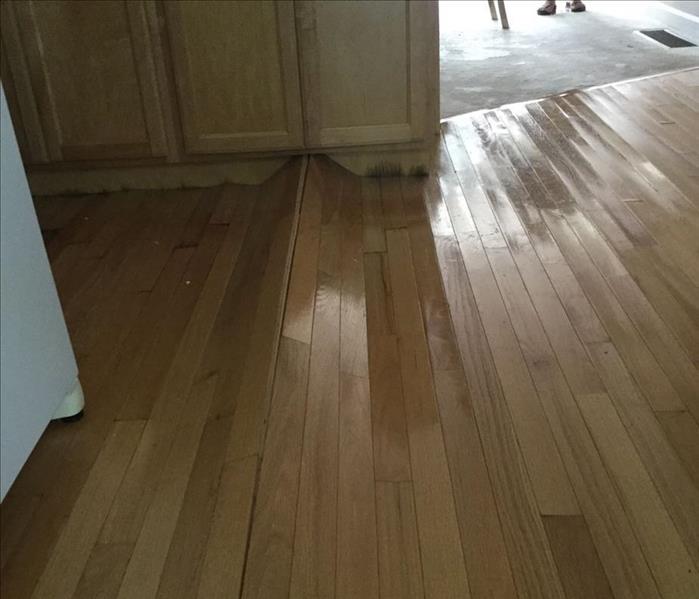 This image shows a hardwood floor that has buckled due to water damage.
This image shows a hardwood floor that has buckled due to water damage.
SERVPRO of Danvers/Ipswich is available 24 hours a day for water emergencies, large or small. When you are dealing with water damage, immediate action is crucial. A delay of just a few hours can greatly increase the severity of the water damage.
We Answer the Phone Ready to Help
Call Today - 978-356-7077
We understand that when you call us, you may be feeling confused, stressed, and vulnerable. You need an expert to guide you through this crisis. SERVPRO of Danvers/Ipswich has the specific water damage training and experience to help you through this tough time. We specialize in water damage restoration—in fact, it's the cornerstone of our business.
What to Expect
When you call, we will ask several questions regarding your water damage emergency. These questions will help us determine what equipment and resources to bring, including how many trained SERVPRO Professionals may be needed.
Our SERVPRO Representative will ask several questions:
- Your name and contact information
- Your insurance information (if applicable)
- The street address of the water-damaged home or business
- When did the flooding or water damage occur?
- What caused the water damage (if known)?
- Is there electricity available (on-site)?
About SERVPRO of Danvers/Ipswich
SERVPRO of Danvers/Ipswich specializes in the cleanup and restoration of residential and commercial property after a fire, smoke or water damage event. Our staff is highly trained in property damage restoration. From initial and ongoing training at SERVPRO’s corporate training facility to regular IICRC-industry certification, rest assured our staff is equipped with the knowledge to restore your property.
Ipswich Residents: We Specialize in Flooded Basement Cleanup and Restoration!
2/13/2019 (Permalink)
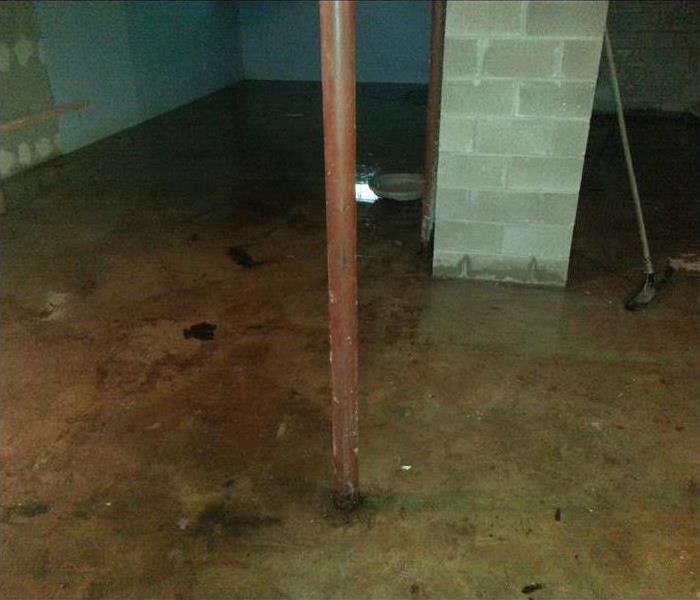 This Ipswich home's basement flooded due to heavy rains.
This Ipswich home's basement flooded due to heavy rains.
A basement can flood at any time, although flooding most often occurs during heavy rainfall. Basements are inherently prone to flooding because they are the lowest level of a building and are normally built partly or entirely below ground level. There are a number of reasons why your Ipswich basement could flood, including:
- A blocked or failed sewer lateral pipe
- Heavy rain causes surface water to pool around your home
- Storm sewer backup
- Sanitary sewer backup
- Foundation drainage failure
- Water supply-line break or hot-water tank failure
- And many more
Have Questions about Basement Flooding?
Call Today – SERVPRO of Danvers/Ipswich
If flood water is not handled quickly and properly, it can jeopardize your health and safety, and cause severe damage to your home’s structure. Remember, the longer you wait, the worse the problem will get.
The bottom line: a flooded basement can jeopardize your health, safety, and your home’s integrity. It’s worth making a call to SERVPRO of Danvers/Ipswich trained, professional crews handle the situation safely and correctly. We have earned the trust of hundreds of homeowners, business owners, and property professionals.
We are Flooded Basement Specialists:
- We are Available 24 hours/7 days per week
- We’re a Preferred Vendor to many National Insurance Companies
- We Bill The Insurance Directly – One Less Thing For You To Worry About
- Our Technicians are Highly-Trained in Water Restoration Techniques
- We use s500 IICRC Restoration Standards
- Advanced Inspection and Extraction Equipment
Basement Flooded? Call Us Today – We’re Ready To Help
978-356-7077
Got Water Damage in your Danvers Home? We Can Help.
2/8/2019 (Permalink)
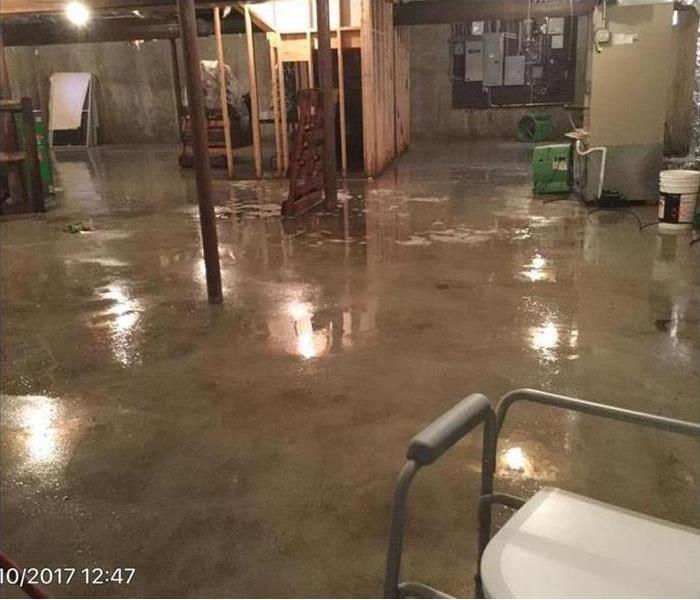 Call the experts at SERVPRO of Danvers/Ipswich if you find yourself with a household flood.
Call the experts at SERVPRO of Danvers/Ipswich if you find yourself with a household flood.
Flooding and water emergencies don’t wait for regular business hours and neither does SERVPRO of Danvers/Ipswich. We provide emergency cleaning and restoration services 24 hours a day, 7 days a week—including all holidays.
Flooding and water damage is very invasive. Water spreads quickly throughout your home and can absorb into the floors, walls, and furniture. Our crews arrives quickly and start the water extraction process almost immediately.
This immediate response helps to minimize the damage and the cleaning and restoration costs. The water damage timeline below details the damage that occurs if no action is taken.
Within Minutes
- Water quickly spreads throughout your property, saturating everything in its path.
- Water is absorbed into walls, floors, upholstery, and belongings.
- Furniture finishes may bleed, causing permanent staining on carpets.
- Photographs, books, and other paper goods start to swell and warp.
First 24 Hours
- Drywall begins to swell and break down.
- Metal surfaces begin to tarnish.
- Furniture begins to swell and crack.
- Dyes and inks from cloth and paper goods spread and stain.
- A musty odor appears.
48 Hours to One Week
- Mold and mildew may grow and spread.
- Doors, windows, and studs swell and warp.
- Metal begins to rust and corrode.
- Furniture warps and shows signs of mold.
- Paint begins to blister.
- Wood flooring swells and warps.
- Serious biohazard contamination is possible.
More Than One Week
- Restoration time and cost increase dramatically; replacing contaminated materials and structural rebuilding may be extensive.
- Structural safety, mold growth, and biohazard contaminants pose serious risks to occupants.
As leaders in the water damage industry, we have advanced training and expertise, and a tremendous amount of hands-on experience. If you need water restoration services, give us a call. We make it "Like it never even happened."
Call us today at 978-356-7077!
Project Estimators Best Tips
6/25/2018 (Permalink)
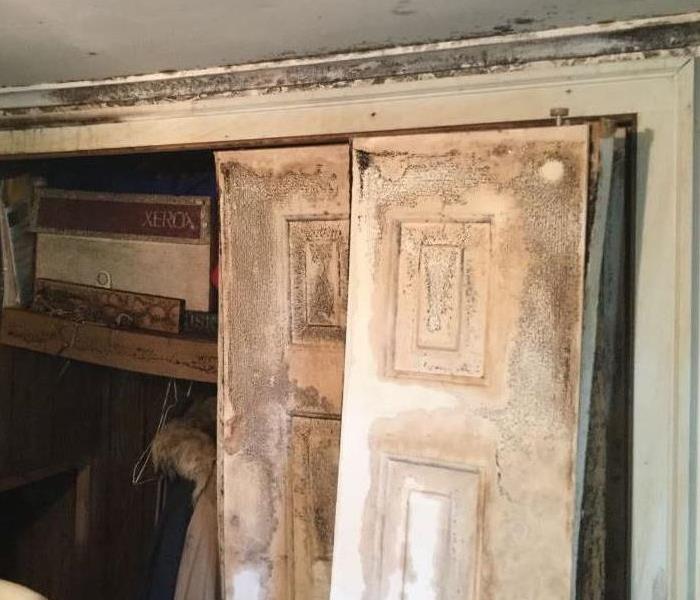 This is an example of mold damage that occurred after the homeowner suffered water damage on the floor level.
This is an example of mold damage that occurred after the homeowner suffered water damage on the floor level.
Summer brings lots of outside activities and happy memories, lazy days at the beach and nights by the campfire. But it can also bring severe storms. Although these can move out as swiftly as they move in, we often experience heavy rains that the ground simply cannot absorb quickly enough. When that happens, water will find the downward path of least resistance, which can often be your basement.
We asked our Project Estimators, Brian Carifio and Ross Martin, what their best advice was to homeowners after heavy rainstorms. Here are their top tips:
- What’s the first thing you would advise a homeowner to check after a storm?
Brian Carifio: The Basement. Water will find its way there. Ideally, if they’ve been pre-emptive, they’ll have their contents up off of the floor on plastic shelving and/or in plastic containers. Keeping contents 2–4 inches off the floor will help to avoid most flooding concerns. If the water reaches above that, they have a whole other set of problems. Plus, content damage is not generally covered by insurance when due to flash flooding.
- Okay, they’ve done that but they still have water in the basement. What should they do next?
Brian Carifio: Call SERVPRO. Not to sound self-serving but the longer the homeowner waits…or tries to mitigate it themselves, the greater the probability of mold beginning to grow. Most DIY attempts at mitigating water damage fail simply because the necessary equipment is not available to consumers. You need strong extraction systems, high capacity dehumidifiers, and air movers (not to be confused with oscillating fans).
- What’s the worst thing a homeowner can do when they find water in their basement?
Ross Martin: Put an oscillating fan on the standing water. First of all, you can run the risk of electrocution. Beyond that, fans only whisk the air off the top of the water’s surface and move it into the air. Doing that without proper dehumidification in place can lead to mold on other surfaces.
- Can you explain that process more?
Ross Martin: Sure. When you have a flood, if left alone the water will eventually evaporate. But that doesn’t mean it disappears. It simply changes from a liquid to a gas and moves into the air. Moisture in the air is relative humidity. That humid (moisture heavy) air is then able to touch & attach to every single surface in that space and beyond. This is the “perfect storm” for mold growth.
Our process is to first extract the water with truck mounted vacuums, then use our air movers and dehumidifiers simultaneously. The movers circulate the air, keeping it from absorbing into surfaces while the dehumidifiers remove the moisture from the air.
- Can’t homeowners do this themselves?
Ross Martin: Yes and no. There are several points to consider. First, consider the weight of water (not the movie!). A gallon of water weighs 8.34 lbs and most shop vacs hold 10 gallons. That means you’re carrying 83.4 pounds upstairs, multiple times.
Secondly, most people have fans in their home and will put several on the affected wet areas, thinking this will dry it out. It won’t. Fans are not strong enough and they don’t actually dry anything. They just move the moisture off the top surface, dispersing it throughout the air.
And lastly, most consumer bought dehumidifiers are too small to effectively dry the air in an average sized basement. Most are purchased rated at 30 PPD (Pints Per Day). That’s how many pints of moisture it can handle per day. Our smallest is 70 PPD and goes up to over 133 PPD.
There are some steps you can take before help arrives though.
- Remove excess water by mopping and blotting.
- Wipe excess water from wood furniture after removal of lamps and tabletop items.
- Remove and prop wet upholstery and cushions.
- Place aluminum foil or wood blocks between furniture legs and wet carpeting.
- Turn air conditioning on for maximum drying in summer.
- Remove colored rugs from wet carpeting.
- Remove art objects to a safe, dry place.
- Gather loose items from floors.
Sewage Cleanup is a Biohazard
4/10/2018 (Permalink)
Sewage Cleanup and Restoration
Water from sewer system backups should be considered very dangerous. The water is grossly unsanitary and may contain bacteria and viruses that could cause serious illness. Special training and equipment are necessary to safely clean this type of contamination.
When a sewage backup happens, you need to move quickly. Evacuate young children, elderly, people with asthma and weak immune systems first. Then call a plumber to remedy the problem.
Sometimes you can manage small sewage spills without professional help. Small spills are typically confined to a bathroom or part of a kitchen. Major spills, however, require professional help. Sewage is a natural delivery method for disease and infection.
Sewage Backup or Toilet Overflow? Call Us Today – (978) 374-8555
There are three major types of contaminated water. SERVPRO of Danvers/Ipswich will inspect that contaminated water to determine the type of water and then plan the appropriate response to safely restore your home or business.
Frosty's Not The Only One At Risk!
3/26/2018 (Permalink)
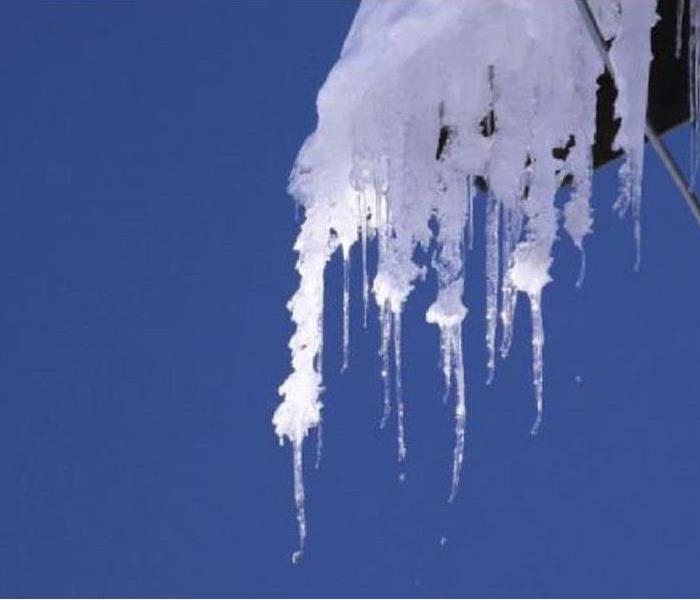
Protecting Your Home from Melting Snow
When temperatures begin to rise after a long winter, it can certainly be reason to celebrate. But if you've got significant snow accumulation on, or around, your home it can also be cause for concern. And not just for Frosty! Here are some tips to help prevent damage to your home as snow starts melting.
- Remove snow from around your home: snow accumulation near your foundation, windows, and doors can leak into your home once it starts to melt. Remember to shovel any decks, driveways or patios that slope towards your home.
- Check your roof and gutters: consider hiring a professional to remove the snow from your roof so that water run-off is at a minimum once temperatures rise. If that's not possible, be sure that your gutters are clear so that the water will have a path away from your home. If possible, attach a sloped leader to your downspout that leads run-off at least 10ft from your home.
- Test your sump pump: if water does get into your basement, you want to be sure it is taken care of quickly. Before the snow starts to melt, test your sump pump and your sump pump discharge pipe to ensure it's in working order.
- Clear snow from drainage areas: storm drains and catch basins can often get clogged with snow — if you can do so safely, clearing snow from these areas can help keep water away from your home.
- Rearrange your storage: in case water does get into your basement, be sure to keep any valuables, chemicals, or anything else you'd like to keep dry off the floor.
- Check your appliances: clear out space around your water heater, furnace and other appliances. If possible, raising your washer and dryer off the floor could help protect from water damage.
- Don't try to do too much: getting on ladders or your roof at any time of the year is a risky proposition, even more so when there is snow involved. Clearing snow and gutters is important in the prevention of water damage, but be sure to use a professional to handle any dangerous situations.
If you do suffer water damage as a result of melting snow, call us. We're here to help!
Sensing Unseen Water Damage
3/7/2018 (Permalink)
Even small water damages have the potential to cause serious structural and indoor air quality issues over time.
The key to avoiding costly future restoration is to handle every water problem as a real threat to your property. SERVPRO of Danvers/Ipswich has the equipment, training and experience to find and dry unseen water before secondary damages occur. The proper equipment makes a measurable difference in reducing the damage expense during a fire or water loss. When time matters, technology and equipment must be counted on to perform. SERVPRO® of Danvers/Ipswich will answer your call with fast action and a full arsenal of drying equipment. Here are a few of the tools used:
- Moisture Sensors are used to detect moisture in carpets, baseboards and Moisture Meters (pictured) are used to determine the actual moisture content of various materials. The moisture tester provides accurate readings, allowing SERVPRO® Franchise Professionals to monitor the drying process.
- Thermohygrometers measure temperature and relative humidity. When armed with this information, SERVPRO® of Danvers/Ipswich can calculate and create an environment most conclusive to drying.
- When facing a contaminated water loss, it is not only important to dry the structure, but the structure must also be disinfected and often deodorized.
- Ultra-Low-Volume (ULV) Foggers will atomize liquid deodorizing agents, producing a fine mist that can easily penetrate the site where odor-causing residues may accumulate. This device can also be used to inject fungicides and disinfectants into wall cavities and other hard-to-reach
- Thermal Foggers dispense solvent-based produces by creating a dense fog. The fog consists of tiny particles of deodorant solution that attach to and neutralize odor causing particles.
What is the bottom line? SERVPRO® of Danvers/Ipswich has the training and equipment to help make it "Like it never even happened."
What To Do If Your House Floods
3/2/2018 (Permalink)
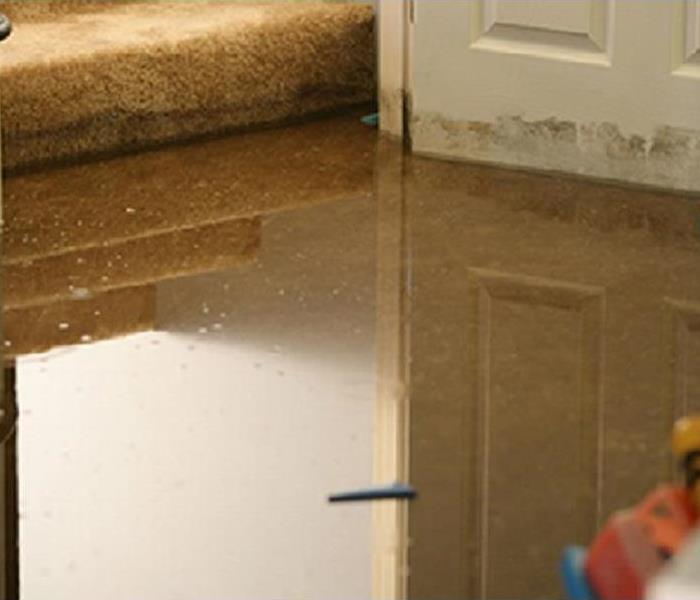 Flooded living room. Image via SERVPRO.com (copyright free)
Flooded living room. Image via SERVPRO.com (copyright free)
With the crazy weather we've been experiencing lately, house and/or business flooding is a real concern. Luckily, we can step in to help minimize the damage and get your back to normal living conditions, but there are some other important steps to take as well.
Stop The Flow
Your first priority is stopping the flow of water. If the flooding is due to storm surges, you should be seeking safe ground. Your possessions are replaceable. You aren't!
If you have time however, turn off electricity at the fuse box. If you can’t reach the box without wading into water, call an electrician and stay out of the wet areas. Most people don't think of this step during a flood but doing so can save a lot of extra repair once you're back in the house.
Snap It, Document It
Before removing any water, document the damage for your insurance company. Capture the extent of the water damage and all possessions impacted by the flood. Digital photos are best because you can quickly upload them directly to your agent for assessment.
Contact your insurance company as soon as possible and follow their directions. Not all flooding is covered by a basic homeowners policy, so work with your agent to discover the cause and identify coverage you can qualify for. Do not remove any water before talking to them so you don’t accidentally do anything that will decrease the amount of coverage you’ll be able to claim. If the insurance company wants you to wait for an adjuster before making repairs, do so — but make sure you give them a clear picture of the damage and repairs that are immediately needed.
Protect Yourself
You won’t know immediately if the water is contaminated, so take precautions to safeguard your health. Wear protective gear like waders or rubber boots and rubber gloves before delving into the water and removing water-logged possessions. If possible, remove children from the home until the damage is assessed and contained.
We're Here To Help
We are truly "faster to any disaster." When your home or business has water damage, we have the expertise and equipment to properly restore your property. The water removal and water cleanup process is completed by our highly-trained technicians who will document the drying process. This validates that your property has been dried properly and thoroughly.
Please follow the tips outlined in our Water Damage Tips—Until Help Arrives Guide to protect yourself and your property.
Winter Weather Tips
2/13/2018 (Permalink)
Punxsutawney Phil saw his shadow and the national weather reporting agencies are predicting cold temps reaching into April, even early May possibly. Don't shoot the messenger!
With that said, two of the biggest problems our customers encounter are frozen pipes and ice dams. A frozen pipe can burst causing considerable damage to your property if not addressed. Ice dams cause a back-flow under the roof’s shingles and can affect your structure’s interior areas. Below are some tips on how to prevent this damage and prepare your home for the winter weather.
Quick Easy Steps to Avoid Burst Pipes & Ice Dams:
- Keep cabinet doors open during cold spells
- Keep a slow trickle of water flowing through faucets
- Consider shutting off outdoor faucets
- Ensure gutters are clean and secure
- Inspect property for proper drainage to alleviate flood hazard potential
SERVPRO® of Danvers/Ipswich is your local fire and water damage restoration company. Servicing the North Shore and Merrimack Valley for over 30 years, SERVPRO® understands the stress and worry that comes with a fire or water damage and the disruption it can cause your life, home or business. Our goal is to help minimize the interruption to your life and quickly make it “Like it never even happened.”®
Flooded School in West Newbury, MA
1/10/2018 (Permalink)
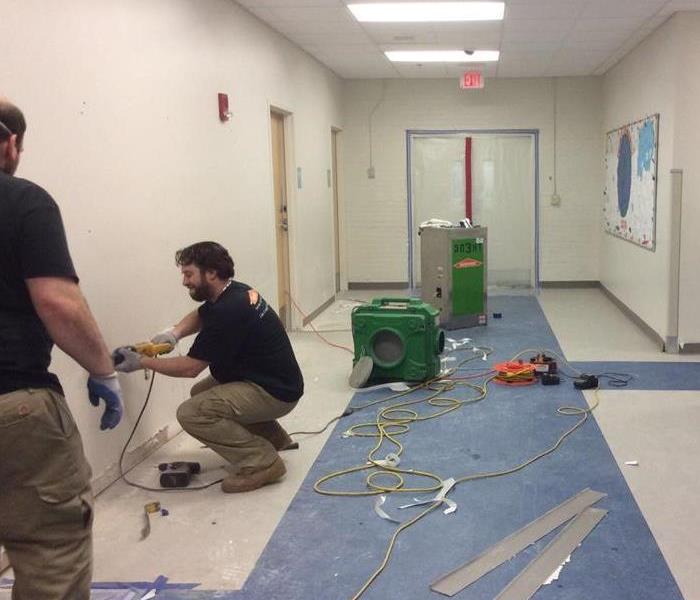 Crew members starting to cut back the drywall to limit the mold risk.
Crew members starting to cut back the drywall to limit the mold risk.
Is Your Business Prepared For A Crisis?
Instead of ringing in 2018 with toasts of prosperity and good health, many business found themselves focused on damage control as record low temperatures hit Massachusetts, causing pipes and sprinkler systems to freeze and burst. Such was the case at a beloved, local elementary school in the overnight hours of a very cold January night when a pipe ruptured in a first floor bathroom sending 30,000 gallons of water rushing, unrestrained, through hallways, classrooms, and ceilings of the Page School in West Newbury, MA.
When a catastrophe such as this occurs, it’s the level of preparedness, training, proper equipment and a plan of action that can make the difference between an inconvenience and a total loss for your business.
Because Page School had the foresight to work with SERVPRO of Danvers/Ipswich to complete an ERP (Emergency Readiness Plan), the maintenance team and first responders were able to quickly locate the shut-off valves, stemming the continued flow of water and therefore, minimizing the loss and environmental risk.
An ERP is a simple preparedness program that is completed at no charge to the customer. It provides a digital blueprint of key information such as location of utility shut-offs, property details, building access, and important contacts that may otherwise be floating in a paper file or on a computer hard drive inaccessible to you. A true game changer during any crisis, right on your phone…in a simple, free app.
When our SERVPRO of Danvers/Ipswich franchise received the call at 1:00 a.m., we were onsite within 30 minutes. The project was assessed, an emergency team was assembled, and mitigation began within 2 hours. No time was wasted in containing necessary areas, extracting water, dehumidifying and drying, disinfecting and removing saturated drywall.
The key to remediation is time…the quicker you start extracting and drying, the less time the water has to saturate and permeate surfaces. Removing drywall above the water line is paramount as mold can start to grow in as little as 3 days. When not correctly managed, it can grow silently, unbeknownst to you, within the drywall as it did at Page School, causing even more problems when it’s eventually discovered.
Disinfecting all areas, from ceiling to floor is also a concern as water can carry bacteria, dirt, and debris, depositing it in areas where you eat, work and play.
The SERVPRO of Danvers/Ipswich emergency crew worked in shifts until the entire school was cleaned and moisture readings were back to an acceptable level. Although crews still remain there to remediate the mold, the original crisis is a memory.
In a press release issued to the media on January 3, Superintendent Mulqueen sites the timely response of West Newbury’s emergency responders, the District’s facilities team, and SERVPRO of Haverhill/Newburyport as the main factors in minimizing damage to the school.
The moral of this story is preparedness as well as working with trained professionals who make it their job to remain focused and productive during a crisis. You may never need to engage such a system but when & if you do, having a trained response team ready to go will get your life back to working order faster and with less stress.
SERVPRO of Danvers/Ipswich mitigates thousands of losses each year. If you are interested in insuring your business is prepared for the unexpected, call us to learn more about our Emergency Readiness Program (ERP) at 978-374-8555 or 978-356-7077.
SERVPRO of Danvers/Ipswich - Quick Response for Water Damages
4/13/2017 (Permalink)
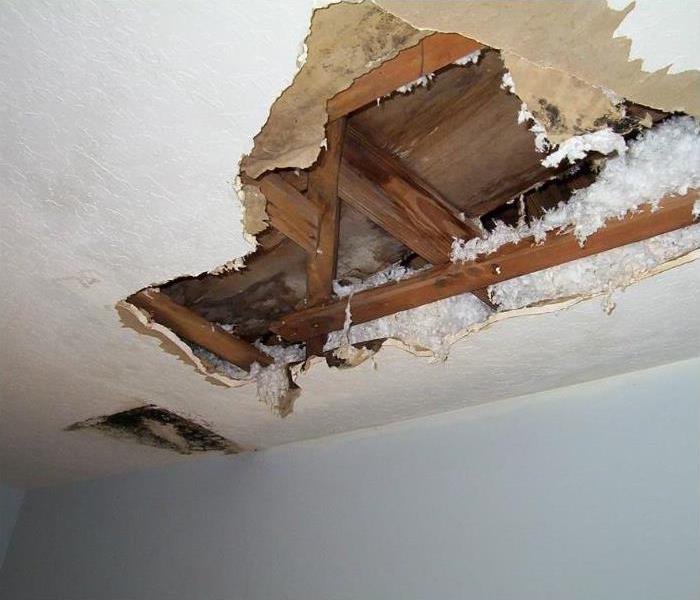 Water quickly spreads throughout your home and gets absorbed into floors, walls, furniture, and more. Image via Shutterstock.com (copyright-free)
Water quickly spreads throughout your home and gets absorbed into floors, walls, furniture, and more. Image via Shutterstock.com (copyright-free)
Flooding and water emergencies don’t wait for regular business hours and neither does SERVPRO of Danvers/Ipswich. We provide emergency cleaning and restoration services 24 hours a day, 7 days a week—including all holidays.
Flooding and water damage is very invasive. Water quickly spreads throughout your home and gets absorbed into floors, walls, furniture, and more. SERVPRO of Danvers/Ipswich arrives quickly and starts the water extraction process almost immediately.
This immediate response helps to minimize the damage and the cleaning and restoration costs. The water damage timeline below details the damage that occurs if no action is taken.
Within Minutes
- Water quickly spreads throughout your property, saturating everything in its path.
- Water is absorbed into walls, floors, upholstery, and belongings.
- Furniture finishes may bleed, causing permanent staining on carpets.
- Photographs, books, and other paper goods start to swell and warp.
First 24 Hours
- Drywall begins to swell and break down.
- Metal surfaces begin to tarnish.
- Furniture begins to swell and crack.
- Dyes and inks from cloth and paper goods spread and stain.
- A musty odor appears.
48 Hours to One Week
- Mold and mildew may grow and spread.
- Doors, windows, and studs swell and warp.
- Metal begins to rust and corrode.
- Furniture warps and shows signs of mold.
- Paint begins to blister.
- Wood flooring swells and warps.
- Serious biohazard contamination is possible.
More Than One Week
- Restoration time and cost increase dramatically; replacing contaminated materials and structural rebuilding may be extensive.
- Structural safety, mold growth, and biohazard contaminants pose serious risks to occupants.
Call us today at 978-777-3498 for more information.
Severe Spring Weather Tips
3/24/2017 (Permalink)
While spring brings the promise of warm weather and longer days, it also brings a variety of conditions that can include heavy rains and severe weather, which can increase your flood risk. Take action to protect yourself, your family, and your business—before a weather event occurs and it’s too late.
April marks the start of the rainy season. Spring storms can bring several inches of rain in only a matter of hours or there can be consistent rainfall for days. These heavy rains can lead to severe flooding by over-saturating the ground, overfilling storm drains, or rivers spilling over their banks.
As one of the most common hazards in the United States, it’s important we prepare for the potential disaster that flooding can cause. Even if you feel you live in a community with a low risk of flooding, remember that anywhere it rains, it can flood. Just because you haven’t experienced a flood in the past, doesn’t mean you won’t in the future.
In order help prepare you for the possibility of a flood, we offer you these tips:
- Build an emergency kit and make a family communications plan
- Avoid building in a floodplain unless you elevate and reinforce your home
- Elevate the furnace, water heater and electric panel in your home if you live in an area that has a high flood risk
- Install check-valves to prevent flood water from backing up into the drains of your home
- Seal basement walls and floor with waterproofing compounds to prevent seepage through cracks
- Always keep your gutters and downspouts clean to allow water to flow freely
- Prepare a flood evacuation plan
- Know how to safely shut-off utilities
- Keep insurance and vital records in a water-proof box
- Have a portable radio to listen for important current information
When your home sustains water damage from flooding, you should call SERVPRO of Danvers/Ipswich immediately. SERVPRO of Danvers/Ipswich professionals have the expertise to prevent or mitigate the devastating effects that water damage can have.
SERVPRO of Danvers/Ipswich has the equipment and experience necessary to handle the most challenging water damage and removal situations and we are available around-the-clock. Call us at (978) 777-3498, and we’ll return your home back to normal, "Like it never even happened."®
Winter Weather Tips
12/13/2016 (Permalink)
SERVPRO® of Danvers/Ipswich is your local fire and water damage restoration company. Servicing the North Shore for over 30 years, SERVPRO® understands the stress and worry that comes with a fire or water damage and the disruption it can cause your life, home or business. Our goal is to help minimize the interruption to your life and quickly make it “Like it never even happened.”®
With the cold weather upon us, two of the biggest problems our customers encounter are frozen pipes and ice dams. A frozen pipe can burst causing considerable damage to your property if not addressed. Ice dams cause a backflow under the roof’s shingles and can affect your structure’s interior areas. Below are some tips on how to prevent this damage and prepare your home for the winter weather.
- Keep cabinet doors open during cold spells
- Keep a slow trickle of water flowing through faucets
- Consider shutting off outdoor faucets
- Ensure gutters are clean and secure
- Inspect property for proper drainage to alleviate flood hazard potential






 24/7 Emergency Service
24/7 Emergency Service












